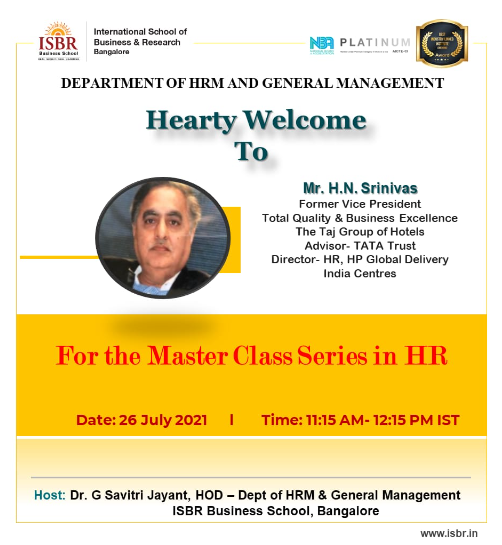Mr. H. N. Srinivas, worked with THE TAJ GROUP OF HOTELS for 25+ years growing up to Sr. Vice President –Total Quality and Business Excellence (Corporate Quality Head) and Sr. Vice President –Human Resources. People practice function at Taj successfully built a customer centric work culture through innovative employee engagement practices. This was acknowledged by Gallup Incorporated, US, by listing Taj among the top 15 companies in the world; was the recipient of Global Great Workplace Award for 4 consecutive years. This journey of building benchmark HR practices at Taj has become a Harvard case study. Taj hotels were also recognized with Tata Business Excellence Award (based on Malcolm Baldridge National Quality Award) for achievement of highest standards of service quality, employee engagement and customer excellence. Also lead the relief and rehabilitation operation for terror victim families in the city of Mumbai post 26/11 terror attack. Worked with HP-Global Delivery India Centre as Director –Human Resources for 3 years managing end-to-end HR for a workforce of about 10,000 employees mostly software engineers. Worked as Advisor Tata Sons on a major Skill Development project that was conceptualized by the then Chairman, to support and
facilitate vocational skills initiative in India and achieve a target of 1 million under privileged youth trained vocationally for gainful employment. Currently working with Tata Trusts and Tata Institute of Social Sciences on major projects of Skill Development and helping youth from weaker sections of the society to get trained for livelihoods and jobs.
Abstract/Snapshot: The session started at 11.15 am Flow of the event: The speaker directly started the session with the rewinding of the previous class concepts. Learnings from the event: He explained about the Industrial relations and labor compliance which is the Phase 2 of HR evolution. He explained in detail about how Legislation was implemented after conflict of interest from financiers and labour officers for implementing the basic needs for the employers. He also talked about the Industrial dispute act and how to define the terms of coexistence, issues of employment terms, issues pertaining to conditions of labor. He then gave examples about how conciliation, arbitration and adjudication works. He also talked about the labour court, industrial tribunal, etc. He gave detail about the Employee state insurance Act, Provident Fund Act, Payment of gratuity, Bonus Act. He talked about how the role of employees changed from exploitation to health and safety care of employees The conditions of work should be cordial and conducive. Various benefits like Paid leave, Maternity leaves, Work ben compensation etc. From phase two, HR evolved to phase 3 which is the motivation phase. He also explained about Abraham Maslow’s motivation theory with an example. He concluded by saying employers should understand what makes the employees happy. They should
empathize with employees. Companies should have an answer for the career development. If so then lot of efficiency will be poured in by the employees in the work. Companies should address any problems of employee and give them the opportunity to grow in the company. Talent management is developing people, encouraging them, creating those conditions, noble job contributions. When employees self-actualize and move to the higher stages, companies should also be ready to provide that growth.

